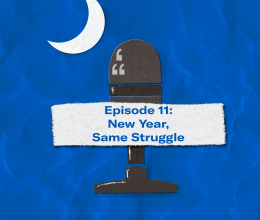
The Legal Defense Fund (LDF), American Civil Liberties Union (ACLU), ACLU of South Carolina, and Arnold & Porter filed a motion today in the U.S. Supreme Court to affirm a federal court’s ruling that South Carolina’s Congressional District 1 was a racial gerrymander and designed with discriminatory purpose. The motion was filed on behalf of the South Carolina State Conference of the NAACP and an individual voter, Taiwan Scott.
In January 2023, a unanimous three-judge panel ordered South Carolina to redraw its 2022 enacted congressional map after an eight-day trial where they heard testimony from 24 witnesses, including six experts, and received 652 pieces of evidence. That evidence demonstrated the hallmarks of racial predominance and intentional discrimination in the design of the 2022 congressional map. Plaintiffs highlighted how the Legislature purposefully engineered the map to dilute Black voting power — and demonstrated how lawmakers hid behind arbitrary justifications to achieve their goal.
“Black South Carolina voters should not have to endure the indignity of a racially gerrymandered and intentionally discriminatory congressional map,” said Leah Aden, LDF’s deputy director of litigation. “The unanimous three-judge panel correctly found that the congressional lines in Charleston County are racially discriminatory and thus unlawful under our Constitution. The U.S. Supreme Court should affirm the panel’s decision so that South Carolina can remedy the harms by adopting a fair and non-discriminatory congressional map.”
“South Carolina enacted a textbook racial gerrymander in Charleston County, and the lower court’s ruling got it right,” said Adriel I. Cepeda Derieux, deputy director of the ACLU’s Voting Rights Project. “Mapmakers moved Black voters in disproportionate numbers out of one district and into another — and they did so on purpose and because of the voters’ race. That brazen effort to carve up Black communities to secure lawmakers’ power cannot stand.”
“The panel of judges correctly ruled that South Carolina’s congressional map was racially gerrymandered, designed to dilute Black South Carolinians’ political power in the hall of Congress,” said Brenda Murphy, president of the South Carolina State Conference of the NAACP. “We remain hopeful that the Supreme Court will affirm the panel’s decision to clear the way so that we can remedy this blatant racial discrimination. We stand ready to continue working with community members throughout South Carolina to enact a new congressional map that provides fair and equal representation in our state.”
“South Carolina enacted a congressional map that minimizes Black voters’ power and silences our voices,” said plaintiff Taiwan Scott. “As the panel of judges already recognized, rectifying this egregious discrimination requires enacting a fair map. We believe the Supreme Court will uphold the panel’s decision so that we can move one step closer to achieving the fair representation that is constitutionally required.”
“The rights of Charlestonians and all South Carolinians to have their congressional districts set in a legal, fair, and non-discriminatory manner were unquestionably violated in this case,” said John A. Freedman, Arnold & Porter’s senior pro bono counsel. “We are proud to stand with our co-counsel and clients to vindicate these important principles.”
“The evidence speaks for itself,” said Allen Chaney, legal director of the ACLU of South Carolina. “Rather than respecting the voters of South Carolina or the rule of law, the Legislature passed an illegally gerrymandered map that intentionally suppressed the political power of Black voters. We look forward to continuing this fight for a fair, non-discriminatory redistricting plan.”
Read the motion urging the Supreme Court to affirm the federal court’s ruling here.
Read the unanimous three-judge panel’s decision being appealed here.
###
Founded in 1940, the Legal Defense Fund (LDF) is the nation’s first civil rights law organization. LDF’s Thurgood Marshall Institute is a multi-disciplinary and collaborative hub within LDF that launches targeted campaigns and undertakes innovative research to shape the civil rights narrative. In media attributions, please refer to us as the Legal Defense Fund or LDF. Please note that LDF has been completely separate from the National Association for the Advancement of Colored People (NAACP) since 1957—although LDF was originally founded by the NAACP and shares its commitment to equal rights.








